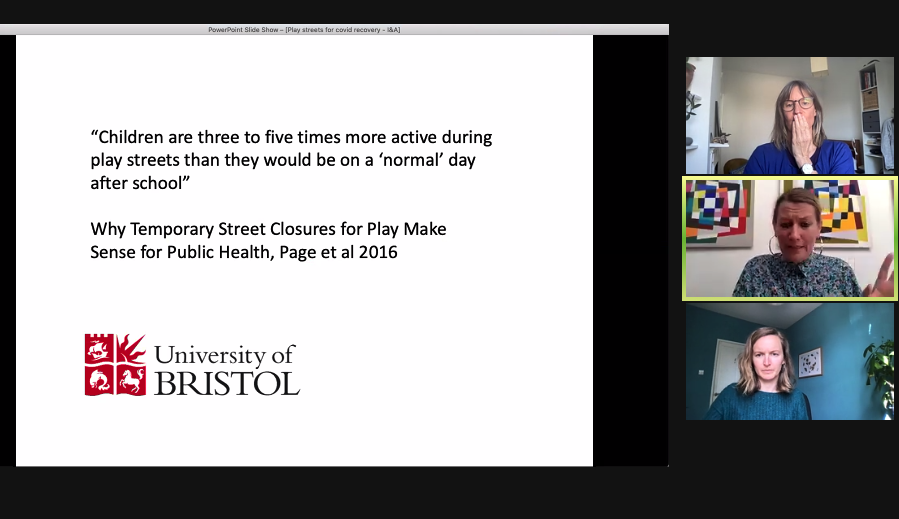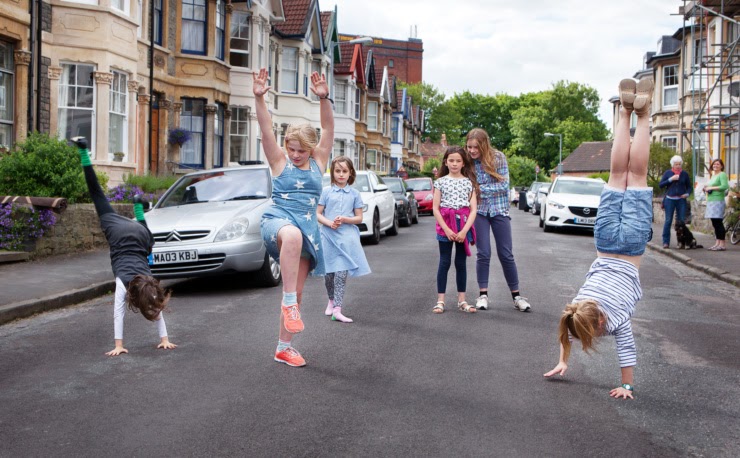Written by:
In March, I attended Playing Out’s event – Play Streets for Covid Recovery. The insightful event focused on how we can make temporary spaces for children to learn, play and discover safely during the pandemic.

Play before and now
In the 1980’s playing outside was the norm. It happened throughout the day and brought a sense of community and exploration. Children learnt independence through this freedom of play, and by exploring their local neighbourhood with peers they gained social and emotional skills.
However, since then this trend has receded and parents feel their children have lost the chance to play out. With our spaces and neighbourhoods becoming more car and traffic dominated, giving children free roam to play out no longer seems like a safe or welcoming option for many.
The start of the Playing Out movement
Playing Out began in 2009 on a street in Bristol. A local group of parents banded together to create spaces for children to play like they did when they were growing up. By working with their neighbours and the council to close their street to traffic, they opened up the space for play. The initial sessions were so successful that the model has spread across the country, leading to a national movement for change.
The collective applied to their local council to close their residential road after school to create a test bed, chalking up the roads and organising other neighbours as traffic diverters for those driving near the area. Other local parents were also consulted before the experiment went ahead.
The collective found children of all ages and from various backgrounds and schools played together and reacted to the spaces they were given. No activities were prescribed or food provided, and the children instinctively used their own initiative to create games and the right atmosphere for sharing and skills building.


Future plans for the Play Streets initiative may explore starting play streets at nearby schools, so that parents who are interested could still get their children involved, learn more and then possibly replicate the model in their residential areas.
Covid and play
Now more than ever, communities need to come together. Childrens’ needs and how they feel are often neglected in regards to public space and community engagement. However, spaces that are well designed for children are often the most suitable and accessible for us all!
It’s been a hard year for everyone, but the effect of covid on children is often not considered from a play perspective. Those from disadvantaged communities unfortunately seem to be suffering the most, as activities and after school clubs have been heavily disrupted. Younger children and single child families are often at a disadvantage as their children can’t go out alone. The Play Streets initiative would mean local people could protect and guide children playing in the street, giving even the most disadvantaged children access.

The anxiety and uncertainty that covid has brought can be damaging for young minds, and being inactive indoors during lockdown can exacerbate negative feelings. This is where the value of play streets is evident, by being able to connect with other children, use their imagination and be active, the young can work through their feelings while learning important skills in relation to empathy, communication and connecting with others.
Activity and fitness
A worrying trend is emerging. Children have been more largetic and anxiety riddled1 now they’re back in school. They crave and need more time outside, fun, other children to work through their issues and feelings, all whilst having space to express themselves.

After school clubs and sports are extremely important in early childhood, but often parents and carers need extra disposable income to budget for these activities, as well as a vehicle to transport their child to and from such extra-curricular activities. These resources aren’t always available, therefore restricting children’s play to indoor entertainment and video games, which in turn equates to more screen time.
These methods of play are less inclusive, and according to NHS England only 18% of children and young people are meeting the current Chief Medical Officer guidelines of taking part in sport and physical activity for at least 60 minutes every day 2. This is an appalling statistic, but by invigorating children via this gathering of community time, effort and spirit, we can hopefully change it for the better in the coming years.
We’ve seen how useful technology can be during the pandemic, such as starting mutual aid groups and Zoom communities that connect those living in isolation. Using our gumption, resident-led activity and power lead to a great furore of community togetherness. We need to keep this going to find solutions to other problems.
Fighting loneliness and anxiety
The mental health of parents is also a key consideration, with many during the pandemic juggling with teaching, entertaining and caring for their children, all while possibly wrestling with work, home tasks and other obligations (such as caring for elderly parents and other relatives). They themselves may be busy and isolated.
Therefore, it is imperative that play streets aren’t seen as one off events, instead they should take place regularly as part of local and national strategies, as a way to help parents as well as children, with the potential to lower traffic levels whilst encouraging more walking and cycling, to the benefit of all. We have to create safe places for people to come together, feel connected, heal and to hold on to what has been gained.
“Playing out is not just about play and not just for children. It promotes an increase in neighbourliness, a sense of belonging, and safer, friendlier streets.”
Professor Alison Stenning, Chair in Social and Economic Geography, at Newcastle University.
Conclusion
Playing out should be the norm, so all children can be given the same opportunities,
experiences, and benefits without class or background being a barrier. As the Playing Out team have dubbed it, ‘The Democracy of Play’. The team hopes to continue to reclaim streets for children’s needs.
Alison Stenning of Newcastle University encourages tackling loneliness with Play Streets, and after a year and a half of restrictions which have kept us safe, but have isolated and alienated some, the hope is that Playing Out schemes can become well established nationwide.
To find out more about Playing Out, you can visit their website. Find out more about starting a play street here. You can also follow them on Facebook, Instagram and or Twitter.
- Coronavirus: Impact on Young People with Mental Health Needs https://youngminds.org.uk/about-us/reports/coronavirus-impact-on-young-people-with-mental-health-needs/
- Publication, Part of Statistics on Obesity, Physical Activity and Diet. Statistics on Obesity, Physical Activity and Diet, England, May 2019 – https://digital.nhs.uk/data-and-information/publications/statistical/statistics-on-obesity-physical-activity-and-diet/statistics-on-obesity-physical-activity-and-diet-england-2019/part-5-adult-physical-activity

